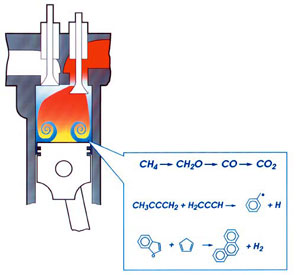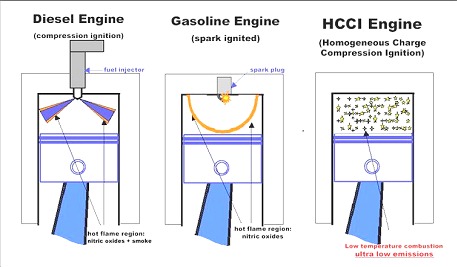| 2005 |

|
YEAR BOOK |
National University of Ireland, Galway
|
Cleaner burning for a greener world
|

As the only Irish group interested in the chemical details of the burning process, we are in a position to contribute to new and exciting developments in technology such as the homogeneous charge compression ignition or HCCI engine which combines the best features of present-day diesel and spark-ignition engines. Operating an HCCI demands a much better understanding of the chemistry involved, not studied in detail before as it takes place at high temperatures and pressures and is thus difficult to study in conventional lab equipment. However we have built two devices, which cannot be found in a single laboratory anywhere else in the world:
-
Rapid compression machine � 1 of only 12 in the world
-
Instrumented shock tube � probably only 20 in the world.
The award in 2005 of an EU Marie Curie Transfer of Knowledge grant sets the seal on a remarkable period of growth for the Combustion Chemistry Group whose newest lab is located in the Environmental Change Institute . The contract, ' Towards a World Class Combustion Chemistry Centre ', will enable the Group to acquire some essential additional skills to further enhance our capabilities.
Collaborations
Because we are the only group working in Ireland in this area we collaborate with colleagues abroad by sending our graduate researchers to foreign labs, to learn new techniques and use equipment not available here. The experience of living and working in California or France has been beneficial for the students and has attracted much favourable comment from potential employers.
With international industry: We have an extensive range of collaborations, some stemming from the time that our Associate Director spent in the United States � General Motors R & D Centre, Cummins Engine Co., Ford Motor Co., ExxonMobil Research & Engineering, etc. We are carrying out experiments for Rolls Royce Power Generation (Canada), and, given that many multinationals have downsized their R & D operations, this research will expand.
Our interaction with Irish companies is much more modest, reflecting the lower level of R & D activity in this country. However, apart from routine chemical analysis for companies, we have helped entrepreneurs design an oil burner and a small-scale incinerator for the safe disposal of non-hazardous waste.
With other research institutes: We have good collaborative links with top-flight research institutes and universities � in the USA with the Departments of Mechanical Engineering at both Princeton and Stanford, and, the Combustion Research Facility at Sandia National Laboratory; in France with the CNRS Laboratoire de Combustion et Syst�mes Reactifs in Orl�ans, in the UK with the Department of Fuel and Energy of Leeds University and the Department of Mechanical Engineering in Imperial College London.
Presentations and Publications
Presentations: Both the Director and the Associate Director were invited to present work at American Chemical Society meetings in Anaheim (March 2004) and Philadelphia (August 2004). Such invitations, to the pre-eminent professional association for chemists, are rare. We participate fully in the biennial International Symposia on Combustion, the European Combustion Meetings and the International Shock Wave Symposia.
Publications: We publish on a diverse range of topics in the combustion field partly because being a small research group on the periphery of Europe, and, without local expertise to call on, we have had to teach ourselves new skills. Thus we have developed, for example, expertise in computational fluid dynamics which is pure engineering and very unusual for chemists to attempt at all.
Software: Applications that we originally wrote for our own purposes have been made freely available to the chemical kinetics community and have been taken up in over 25 countries.

Proven ability to compete
In spite of very difficult circumstances pertaining in Ireland today, with the bulk of research funding funnelled by Science Foundation Ireland into biotechnology and information technology, the Combustion Group has managed to win many competitive awards, when we have been allowed to participate on a level footing.
Wider aspects of our work
As the only experts in the chemistry of combustion we are conscious that we have a wider responsibility and have often written articles for the popular press (most recently on the need for a national strategy towards incineration in The Irish Times ) and in radio interviews ( Today FM on why suburban SUVs should be discouraged � 'gas-guzzlers' and 'danger to other road users').
Our webpage acts as a magnet for queries from across the world, reflecting the fact that we are now one of the few research groups specialising in this economically important area.

|
|
Contact: Professor John M. Simmie, Director, Dr Henry J. Curran, Associate Director,
Combustion Chemistry and Kinetic Modelling Group,
Environmental Change Institute, NUI, Galway;
Web: www.nuigalway.ie/chem/combust.htm